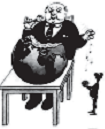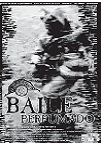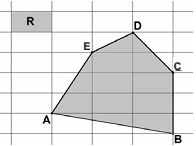Questões de Vestibular CEDERJ 2013 para Vestibular
Foram encontradas 40 questões
(SOUZA, Jorge Vitor. Aqueles que são bem nascidos têm pouca chance de degenerar. In: Tavares, Célia & Ribas, Rogério. Hierarquias, raça e mobilidade social. Rio de Janeiro: Contracapa, 2010, p. 48. Adaptado.)
Em relação à estratificação trinitária da sociedade do Antigo Regime, podemos afirmar que eram estes:


Sobre o Cangaço, podemos afirmar:
 Sobre a Constituição Brasileira
de 1946, podemos afirmar:
Sobre a Constituição Brasileira
de 1946, podemos afirmar:Sobre a história recente deste grande país, podemos afirmar:

A área do pentágono ABCDE é, em cm2, igual a
P1:

P2:

P3:

O primeiro termo da sequência, P1, foi construído com 4 palitos; o segundo, P2, com 7 palitos; o terceiro, P3, com 10 palitos; e assim por diante, isto é, ao enésimo termo da sequência, Pn , acrescenta-se mais um retângulo, utilizando-se um número mínimo de palitos, para formar o termo seguinte, Pn+1. Para construir o vigésimo termo desta sequência, P20, o aluno precisará de
 NH4(aq) + OH−
(aq) , assinale a alternativa que
apresenta a concentração do íon OH−
em mol/L e o pH da
solução nas condições dadas. Considere que para o
hidróxido de amônio Kb=1,0x10-5.
NH4(aq) + OH−
(aq) , assinale a alternativa que
apresenta a concentração do íon OH−
em mol/L e o pH da
solução nas condições dadas. Considere que para o
hidróxido de amônio Kb=1,0x10-5.I 2-metilbutano + bromo (luz e calor) → A + HBr
II Etano + bromo (luz e calor) → B + HBr
Os produtos indicados pelas letras A e B são respectivamente:

As funções representadas nas figuras pelos números 1, 2, 3 e 4 são, respectivamente:
Michelle Hanson
Learning to play a musical instrument at any point in life is good for the brain. Who cares if I sound like a 'sick cow'?

It's exciting to know that I have done something right and rewarding – taking up the cello in my 60s. A new study from St. Andrew's University proves it. Taking up a musical instrument, even late in life, is good for the brain, and “can slow, stop, or even reverse, age or illness-related decline in mental functions". Hurrah!
My efforts have been rewarded, because starting the cello was a bit of a struggle, physically and mentally. Back then, my mother was alive, and rather critical: “You sound like a sick cow," she would cry out in a tormented way, but I persisted, joined an orchestra, and now here I am, with a bigger frontal cortex area than I might have otherwise had, and able to “adjust my behaviour more effectively in conflict-rich situations".
The more you practise the better, suggests the research. Good. It will spur me on, sick cow or not. Because I desperately need to keep my brain in order. Don't we all, if we're going to live to over 100? Last week I went for a walk with an old friend of mine and her dog. She is 92 and browned off.
“How are you?" I asked. “Fed up. I want to die." This was my mother's primary aim once she hit 96. “What do you want for your birthday?" we would ask. “To be dead!", she would say. No wonder. What else did life offer? At least my old friend could walk about. My mother could hardly walk, talk or eat.
If only they had played a musical instrument. You can do it sitting down, on your own, with friends, cheer yourself up, be in control, or wildly emotional. I cannot recommend it highly enough.
Fonte: http://www.theguardian.com/lifeandstyle/2013/sep/ 30/why-i-took-up-cello-in-60s
Glossário
took up: aprendi; struggle: luta/muito esforço; spur me on: encorajar/estimular; browned off: sem entusiasmo
Michelle Hanson
Learning to play a musical instrument at any point in life is good for the brain. Who cares if I sound like a 'sick cow'?

It's exciting to know that I have done something right and rewarding – taking up the cello in my 60s. A new study from St. Andrew's University proves it. Taking up a musical instrument, even late in life, is good for the brain, and “can slow, stop, or even reverse, age or illness-related decline in mental functions". Hurrah!
My efforts have been rewarded, because starting the cello was a bit of a struggle, physically and mentally. Back then, my mother was alive, and rather critical: “You sound like a sick cow," she would cry out in a tormented way, but I persisted, joined an orchestra, and now here I am, with a bigger frontal cortex area than I might have otherwise had, and able to “adjust my behaviour more effectively in conflict-rich situations".
The more you practise the better, suggests the research. Good. It will spur me on, sick cow or not. Because I desperately need to keep my brain in order. Don't we all, if we're going to live to over 100? Last week I went for a walk with an old friend of mine and her dog. She is 92 and browned off.
“How are you?" I asked. “Fed up. I want to die." This was my mother's primary aim once she hit 96. “What do you want for your birthday?" we would ask. “To be dead!", she would say. No wonder. What else did life offer? At least my old friend could walk about. My mother could hardly walk, talk or eat.
If only they had played a musical instrument. You can do it sitting down, on your own, with friends, cheer yourself up, be in control, or wildly emotional. I cannot recommend it highly enough.
Fonte: http://www.theguardian.com/lifeandstyle/2013/sep/ 30/why-i-took-up-cello-in-60s
Glossário
took up: aprendi; struggle: luta/muito esforço; spur me on: encorajar/estimular; browned off: sem entusiasmo
Michelle Hanson
Learning to play a musical instrument at any point in life is good for the brain. Who cares if I sound like a 'sick cow'?

It's exciting to know that I have done something right and rewarding – taking up the cello in my 60s. A new study from St. Andrew's University proves it. Taking up a musical instrument, even late in life, is good for the brain, and “can slow, stop, or even reverse, age or illness-related decline in mental functions". Hurrah!
My efforts have been rewarded, because starting the cello was a bit of a struggle, physically and mentally. Back then, my mother was alive, and rather critical: “You sound like a sick cow," she would cry out in a tormented way, but I persisted, joined an orchestra, and now here I am, with a bigger frontal cortex area than I might have otherwise had, and able to “adjust my behaviour more effectively in conflict-rich situations".
The more you practise the better, suggests the research. Good. It will spur me on, sick cow or not. Because I desperately need to keep my brain in order. Don't we all, if we're going to live to over 100? Last week I went for a walk with an old friend of mine and her dog. She is 92 and browned off.
“How are you?" I asked. “Fed up. I want to die." This was my mother's primary aim once she hit 96. “What do you want for your birthday?" we would ask. “To be dead!", she would say. No wonder. What else did life offer? At least my old friend could walk about. My mother could hardly walk, talk or eat.
If only they had played a musical instrument. You can do it sitting down, on your own, with friends, cheer yourself up, be in control, or wildly emotional. I cannot recommend it highly enough.
Fonte: http://www.theguardian.com/lifeandstyle/2013/sep/ 30/why-i-took-up-cello-in-60s
Glossário
took up: aprendi; struggle: luta/muito esforço; spur me on: encorajar/estimular; browned off: sem entusiasmo
Michelle Hanson
Learning to play a musical instrument at any point in life is good for the brain. Who cares if I sound like a 'sick cow'?

It's exciting to know that I have done something right and rewarding – taking up the cello in my 60s. A new study from St. Andrew's University proves it. Taking up a musical instrument, even late in life, is good for the brain, and “can slow, stop, or even reverse, age or illness-related decline in mental functions". Hurrah!
My efforts have been rewarded, because starting the cello was a bit of a struggle, physically and mentally. Back then, my mother was alive, and rather critical: “You sound like a sick cow," she would cry out in a tormented way, but I persisted, joined an orchestra, and now here I am, with a bigger frontal cortex area than I might have otherwise had, and able to “adjust my behaviour more effectively in conflict-rich situations".
The more you practise the better, suggests the research. Good. It will spur me on, sick cow or not. Because I desperately need to keep my brain in order. Don't we all, if we're going to live to over 100? Last week I went for a walk with an old friend of mine and her dog. She is 92 and browned off.
“How are you?" I asked. “Fed up. I want to die." This was my mother's primary aim once she hit 96. “What do you want for your birthday?" we would ask. “To be dead!", she would say. No wonder. What else did life offer? At least my old friend could walk about. My mother could hardly walk, talk or eat.
If only they had played a musical instrument. You can do it sitting down, on your own, with friends, cheer yourself up, be in control, or wildly emotional. I cannot recommend it highly enough.
Fonte: http://www.theguardian.com/lifeandstyle/2013/sep/ 30/why-i-took-up-cello-in-60s
Glossário
took up: aprendi; struggle: luta/muito esforço; spur me on: encorajar/estimular; browned off: sem entusiasmo
Michelle Hanson
Learning to play a musical instrument at any point in life is good for the brain. Who cares if I sound like a 'sick cow'?

It's exciting to know that I have done something right and rewarding – taking up the cello in my 60s. A new study from St. Andrew's University proves it. Taking up a musical instrument, even late in life, is good for the brain, and “can slow, stop, or even reverse, age or illness-related decline in mental functions". Hurrah!
My efforts have been rewarded, because starting the cello was a bit of a struggle, physically and mentally. Back then, my mother was alive, and rather critical: “You sound like a sick cow," she would cry out in a tormented way, but I persisted, joined an orchestra, and now here I am, with a bigger frontal cortex area than I might have otherwise had, and able to “adjust my behaviour more effectively in conflict-rich situations".
The more you practise the better, suggests the research. Good. It will spur me on, sick cow or not. Because I desperately need to keep my brain in order. Don't we all, if we're going to live to over 100? Last week I went for a walk with an old friend of mine and her dog. She is 92 and browned off.
“How are you?" I asked. “Fed up. I want to die." This was my mother's primary aim once she hit 96. “What do you want for your birthday?" we would ask. “To be dead!", she would say. No wonder. What else did life offer? At least my old friend could walk about. My mother could hardly walk, talk or eat.
If only they had played a musical instrument. You can do it sitting down, on your own, with friends, cheer yourself up, be in control, or wildly emotional. I cannot recommend it highly enough.
Fonte: http://www.theguardian.com/lifeandstyle/2013/sep/ 30/why-i-took-up-cello-in-60s
Glossário
took up: aprendi; struggle: luta/muito esforço; spur me on: encorajar/estimular; browned off: sem entusiasmo